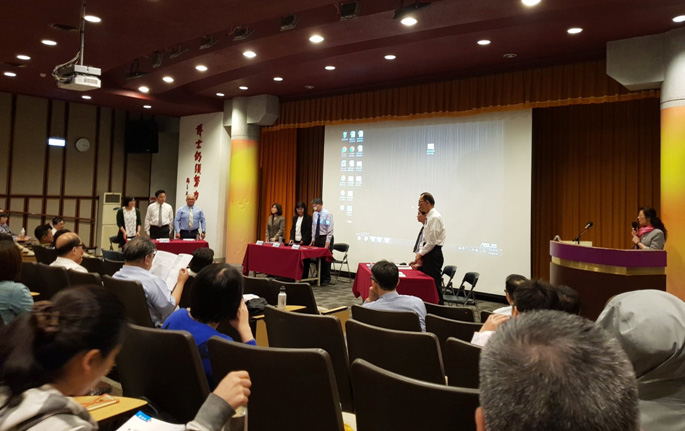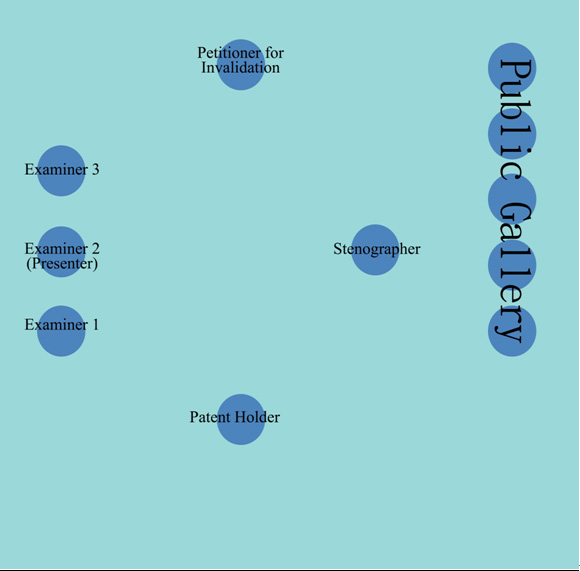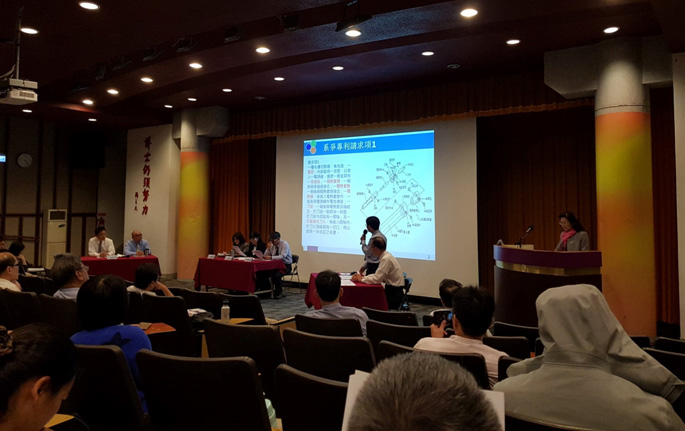|

The mock invalidation hearing held by TIPO as part of their efforts to raise awareness of the new system;
Photo by Conor Stuart
More details of Taiwan’s new hearing system for patent invalidation cases, which is now available as an alternative to the traditional written correspondence between the Intellectual Property Office and the patent holder and the later patent invalidation Interview 2.0 system, have emerged. Examiners from the Taiwan Intellectual Property Office even put on a mock hearing, so that industry representatives could get a firmer idea of what hearings will involve. They are trying to encourage uptake of the scheme, as, although they expected to hold their first hearing in May of this year, no-one has yet applied to participate. The questions thrown up by those attending the conference, however, suggest that certain aspects of the hearings still need to be resolved, particularly in respect to their legal effect, or lack thereof. Representatives from the Intellectual Property Office were also quick to point out that these new measures are stepping stones towards their goal of adversarial administrative proceedings wherein the petitioner for invalidation is the plaintiff and the patent holder plays the role of the defendant.
Basic Structure

A three person panel of examiners will preside over the hearing, with one of them being designated to conduct proceedings. The patent rights holder and the petitioner for invalidation both get to plead their case surrounding specific issues of contention in the case and respond to each other in one session as part of the proceedings. They can use PowerPoint and computer presentations to communicate their case.

A representative of the petitioner for invalidation in the mock hearing makes his case using a PowerPoint presentation; Photo by Conor Stuart
At the end of the hearing, both parties have to sign the minutes of the hearing, which take the form of a summary rather than being a word-for-word log of every word spoken.
Before the public announcement of the oral hearing, which should be made at least 30 days in advance of the hearing, TIPO will be responsible for collecting and ensuring delivery of documents and evidence to each party. After the public announcement of the oral hearing, the parties to the hearing should ensure delivery of the relevant documents and evidence both to TIPO and to each other.
The run up to the hearing will also include a preparatory hearing, depending on how complicated the nature of the case is. In other countries, this is normally held 30 minutes before the formal hearing takes place. This preparatory hearing can allow the formal hearing to go more smoothly than it might otherwise go, or completely do away with the need for the hearing to go ahead.
Hearings are held in the “national language of the Republic of China”, and those who wish to express themselves in other languages should bring a translator. The term national language may create difficulties in oral proceedings for those who speak or wish to speak Taiwanese, Hakka or aboriginal languages, where proceedings will generally be held in Mandarin, the de facto standard language, by examiners who will not necessarily understand other languages which are often also posited as “national languages”.
Development
The first innovation to the invalidation process was with what TIPO call “Interview 2.0” – essentially telephone interviews with examiners, similar to the telephone interviews with examiners that some patent applicants opt for during the patent application process. Before the advent of Interview 2.0, invalidation proceedings took the form of a series of written communications between the Taiwan Intellectual Property Office (TIPO) and the patent holder, in contrast to the practice in other countries, particularly China, which has long implemented oral hearings in patent invalidation proceedings.
Over the years, TIPO has been getting a significant amount of feedback from patent holders and petitioners in Taiwan, asking them if they could investigate the possibility of implementing some of the practices of China’s State Intellectual Property Office’s Patent Reexamination Board, specifically the oral invalidation hearings that they carry out. Although after studying the Chinese system, TIPO felt that they were ready in terms of capability to implement oral hearings, given the number of technical advisors that had moved from working in the courts to the office, there was a feeling from industry that patent attorneys and agents may not be as able to keep up with this shift in the system. There were also some concerns at the opinion gathering stage as to how prepared TIPO was from a practical point of view. This was why the decision was then taken to set an intermediary goal of introducing an interview system.
There are two main aspects to the Interview 2.0 system. The first is that they are focused on specific issues of contention. Before the telephone interview, the party that will engage in the interview has to submit to the examiner the aspect that the interview will focus on.
The hearings are another step in the direction of transparency, with both sides getting to express their opinions and offer a rebuttal to one another’s arguments in advance of deliberations by the panel of three examiners.
|
Now |
Future |
Goal |
Item |
Invalidation Interviews 2.0 |
Patent Invalidation Hearings |
Oral Proceedings |
Adversarial Trial |
Format |
- Focused on interview items
- Full minutes of interview recorded
|
Selected invalidation cases conducted by:
- Transparent proceedings
- Adversarial debate (patent holder and petitioner for invalidation)
- Deliberation by three-examiner panel
|
Revise the Patent Law to allow for the legal effect of patent invalidation hearings, according to demand |
In administrative litigation, the petitioner for invalidation would be the plaintiff and the rights holder would be the defence. |
Effect |
- To avoid a situation wherein written correspondence isn’t able to fully communicate, or leads to misunderstandings.
- Raise examination/invalidation proceedings quality
|
- Allow the parties involved ample opportunity to express themselves in open, transparent proceedings
- The panel judgement prevents prejudice in examination, raising the fairness and accuracy of proceedings
- Avoids appeals procedure, with economic and administrative effect
|
- Patent Invalidation hearings as standard judicial model
- Dispute Examination Group
- Increased administrative effect
|
- The party making judgement will no longer be the defence
- The parties involved will undertake the defence and attack and fulfil their related responsibilities
|
Table source: Jui-Jung Chang’s Presentation at the 2018 Forum for Announcing New Measures in Patent Administration and Examination Practice; Translated from the Chinese by Conor Stuart
The direction TIPO is attempting to push in, however, is to shift from the current hearing procedure, currently allowed under the Administrative Procedure Law (Administrative Procedure Act Article 107(2)[1]) and incorporate hearings into amendments to the Patent Act. When that happens, it is hoped that all invalidations proceedings will be dealt with in an oral hearing format and will be structured similarly to equivalent court proceedings, despite being run by an administrative unit of government.
The legal effect of these hearings is also expected to undergo evolution as its status changes. Whereas currently, one can avoid the appeals procedure by participating in an oral hearing, allowing you to proceed directly to an appeal in the Taiwan Intellectual Property Court, it is hoped that the oral hearings will eventually have administrative effect and the Taiwan Intellectual Property Office will no longer be required to serve as the defendant in proceedings, but rather the petitioner for invalidation would be the plaintiff and the patent holder would be the defendant.
News of the introduction of hearings was first published in February and it was originally hoped that the first hearing could be heard in May, although this is now unlikely, as there has not been as much uptake as expected, perhaps because patent holders and petitioners are nervous about a process they are not yet familiar with. A representative from TIPO stated that they currently expect the first hearing to be held in July. After this, from September to October, additional changes may be made to the process in using these cases using any feedback given TIPO.
Transparency
The hearings will be open to the public, as this is one of the requirements (Administrative Procedure Act Article 59[2]) of the law which made the hearings an option, but the minutes of the hearings will not be publicly accessible. Members of the public who wish to look on from the public gallery must apply 10 days in advance of the hearing. The public aspect is important not only for transparency reasons, but also for their educational value. Watching proceedings from the public gallery may help other patent holders to understand the best approach while pleading an issue to the examiners, and discover what works and what techniques are less successful. It’s also an opportunity to get a deeper understanding of how the examiners at TIPO interpret the implementation of the norms for inventive step.
It will also allow the petitioner for invalidation to learn what arguments the patent holder put forward to defend the patent and give them a chance to counter these arguments. Whereas under the traditional system, the only way the petitioner could find out what defence the patent holder gave for upholding the patent rights, was by applying to see the records of interactions between TIPO and the patent holder.
There has also been criticism from other parties in the records taken of the interview, as lengthy interviews would only be recorded with one or two sentences, suggesting a lack of transparency.
Motivation
The motivation behind the hearings is a pursuit of the English legal concept of natural justice, whereby each party has the right to plead their case and there is not a situation where one party to the case is also responsible for judging the case, such as when TIPO examiners are called to defend a TIPO decision to grant a patent.
The ability to plead one’s own case is also an important aspect that TIPO has reflected on in pursuing changes in the invalidation proceedings.
The main purpose of the hearings is to establish the facts of the case before the invalidation examination which should cut down on administrative expenses and make administrative proceedings more accurate.
Roles
One of the examiners should preside over the hearing and is responsible for following the formal procedures of the proceedings, deciding who is qualified to speak, posing questioning, notifying parties when appropriate, investigating when required, allowing or disallowing speech, changing the date of or cancelling the hearing, and other measures. However all three judges will deliberate and come to a decision on the validity of the patent.
The rules around representation at these hearings are quite strict, as only a patent agent, a patent attorney or a lawyer for either of the parties involved or other parties whose rights will be influenced by the patent in question (licensees, parties to lawsuits involving the patent etc.) can participate.
People whose rights are involved in the patent but who aren’t the patent holder or the petitioner for invalidation can be present, but do not have the right to speak at the hearing, unless they are party to either the petitioner or the patent holder and are given permission to express their opinions during the hearing. They are required to fill out a form stating what their relationship to the patent is in brief and must apply at least 20 days in advance of the hearing.
How to Apply for an Oral Hearing
Two examiners are initially assigned to examine invalidation petitions. If the main examiner believes a particular case would benefit from an oral hearing, they have discretion to designate it for a hearing. The parties involved, after being notified of this decision, are allowed to object to a hearing for reasons specified by TIPO. If the examiner believes the objection is valid, the hearing will be cancelled, however if the objection is not considered valid the hearing will likely still go ahead. Parties to invalidation proceedings can also volunteer to participate in an oral hearing if their case conforms to the conditions listed below, the other party consents and TIPO believes that a hearing would be appropriate for the case in question.
Cases which shall be considered for a hearing include:
- Cases is which invalidations petitions have been made several times or which are or have already been subject to a civil lawsuit
- Cases in which the patent rights have previously been subject to cancellation or a post-grant review by higher level administrative units.
- Cases which may have a serious impact upon public welfare or industrial technology development
- Cases which relate to judicial interpretations
- Cases in which, after a formal examination, further information is needed.
Cases which shall not be considered for a hearing include:
- Cases in which the patent holder has not responded to office actions.
- Simple cases in which the evidence is clear.
- Decisions in which administrative actions are already in effect.
If the case meets these conditions, an additional examiner will be appointed to hear the case, making a total of three. They will meet and delegate tasks between them. A date will be assigned for the hearing.
The documents and evidence will be sent to each party and a formal notice will inform each party of the date of the hearing, and it will also be published online 30 days before the hearing occurs.
The hearing will then be carried out and the examiners will deliberate, then make a judgement in writing.
If either party does not want parts or the entire hearing to be open to the public for a valid reason, they need to apply within ten days of notification of the hearing for the hearing to be conducted in private. If they want to request a date change they must do it at least 10 days in advance of the scheduled hearing.
- The administrative authority shall hold a hearing […] where the administrative authority considers it necessary to hold a hearing.
- The hearing shall be held orally and in public, unless it is otherwise required by law.
 |
|
| Author: |
Conor Stuart |
| Current Post: |
Senior Editor, IP Observer |
| Education: |
MA Taiwanese Literature, National Taiwan University
BA Chinese and Spanish, Leeds University, UK |
| Experience: |
Translator/Editor, Want China Times
Editor, Erenlai Magazine |
|
|
|
| Facebook |
|
Follow the IP Observer on our FB Page |
|
|
|
|
|
|

